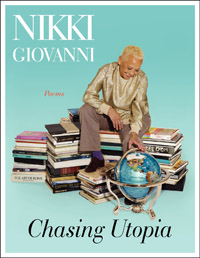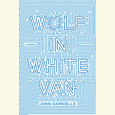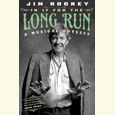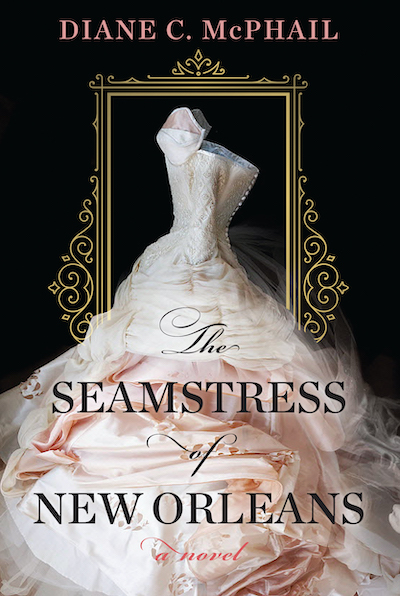A Wise, Intuitive Friend
Nikki Giovanni’s vibrant spirit is evident in her new collection, Chasing Utopia
In Chasing Utopia, a “hybrid” volume of poems, essays, and memoir, Nikki Giovanni recalls a conversation with Nobel Laureate-to-be Toni Morrison. Morrison was fretting about whether it was wise to quit her day job and write full time, and Giovanni assured her that it was. “I’m a poet,” she told Morrison. “We know these things.” That image of the poet as an astute, intuitive friend could be used to characterize Giovanni’s entire oeuvre. Her work does not inhabit a rarefied intellectual realm, and she is not much interested in exploring personal angst. She speaks directly, most often with an attitude of great faith and hope, and she is always concerned with the business of living, whether she’s celebrating simple pleasures, observing the difficulties of love, or denouncing hate. Chasing Utopia wanders a range of forms and themes, but the whole collection is enlivened by Giovanni’s distinctive vibrant spirit.
 Giovanni has always had a great respect for the pleasures of the table, and food is a chief topic of this new collection. Literal and metaphorical references to eating abound. She writes of gutting catfish and snapping beans, and she extols the delights of fine dining (“let me die / in a bowl / of artichoke soup / from Guy Savoy”). In “Spices,” she remembers her mother at the stove, lighting a cigarette as she cooked: “since no one smokes / anymore Beans/ have not tasted as good.” The utopia of the title essay refers to the pricey and hard-to-come-by Utopias beer, and the essay itself is a sort of dizzy paean to the emotional and spiritual importance of food. In “The Significance of Poetry,” poems themselves become food, “as necessary / to life / as salt is to stew / as garlic is to pasta.”
Giovanni has always had a great respect for the pleasures of the table, and food is a chief topic of this new collection. Literal and metaphorical references to eating abound. She writes of gutting catfish and snapping beans, and she extols the delights of fine dining (“let me die / in a bowl / of artichoke soup / from Guy Savoy”). In “Spices,” she remembers her mother at the stove, lighting a cigarette as she cooked: “since no one smokes / anymore Beans/ have not tasted as good.” The utopia of the title essay refers to the pricey and hard-to-come-by Utopias beer, and the essay itself is a sort of dizzy paean to the emotional and spiritual importance of food. In “The Significance of Poetry,” poems themselves become food, “as necessary / to life / as salt is to stew / as garlic is to pasta.”
Giovanni’s take on love, another primary theme here, might best be described as wry. Her characteristic pithy style—which seems to be getting increasingly economical as the years go by—lends her love poems a deliberately detached air even when they express desire or, more often, heartbreak and longing. “I Hate Mondays” is a litany of dissatisfactions that concludes, “I hate it all / ‘Cause I really hate / Not being in love / With you / Anymore.”
“It’s Just Love” lets a note of bitterness strengthen the irony:
just me
just you
just love
yeah
good for nothing
love
throw it away
when you get
tired of it
 Giovanni—who was born in Knoxville in 1943 and is a graduate of Fisk University in Nashville, where she revived the campus chapter of the Student Non-Violent Coordinating Committee (SNCC)—first gained fame with activist poems like “The Great Pax Whitie.” Though her primary themes have become gentler and more personal over time, she has continued to be a sort of poetic conscience—never more so than in “We Are Virginia Tech,” the poem she delivered at a memorial for those slain in the 2007 campus shooting. Chasing Utopia includes a number of commentary pieces that show she has lost none of her eloquence and justified anger in recent years. “Robert Champion (Who Died at the Hands of His Bandmates),” which laments the 2011 death by hazing of a Florida A&M University student, minces no words: “When you act like nazis / Jesus is crucified.” Giovanni still insists on the poet’s responsibility to speak against the great wrongs, even though, perhaps, no remedy is possible. In “Terezin: Where Thirty-Five Thousand Died But It Was Not A Death Camp,” she suggests a parallel between great and small failures of courage, as well as great and small tragedies, and she seems to see all of these as ultimately inescapable, writing, “And I think / The only bravery available / To us / Is to Remember.”
Giovanni—who was born in Knoxville in 1943 and is a graduate of Fisk University in Nashville, where she revived the campus chapter of the Student Non-Violent Coordinating Committee (SNCC)—first gained fame with activist poems like “The Great Pax Whitie.” Though her primary themes have become gentler and more personal over time, she has continued to be a sort of poetic conscience—never more so than in “We Are Virginia Tech,” the poem she delivered at a memorial for those slain in the 2007 campus shooting. Chasing Utopia includes a number of commentary pieces that show she has lost none of her eloquence and justified anger in recent years. “Robert Champion (Who Died at the Hands of His Bandmates),” which laments the 2011 death by hazing of a Florida A&M University student, minces no words: “When you act like nazis / Jesus is crucified.” Giovanni still insists on the poet’s responsibility to speak against the great wrongs, even though, perhaps, no remedy is possible. In “Terezin: Where Thirty-Five Thousand Died But It Was Not A Death Camp,” she suggests a parallel between great and small failures of courage, as well as great and small tragedies, and she seems to see all of these as ultimately inescapable, writing, “And I think / The only bravery available / To us / Is to Remember.”
Such weighty stuff is offset by plenty of light-hearted fare, especially among the memoir pieces, which are filled with sweet family reminiscences. There are several comic essays, including “Making a Perfect Man” and “The Giggle Bank,” which are as warm and fuzzy as their titles suggest. In “Our Job Safety Is Your Priority With Coffee,” Giovanni the longtime teacher has some advice for readers: “I like to think poems are maps—they don’t Google but rather guide us along the way.”
On November 20, 2013, at 6:15 p.m., Nikki Giovanni will discuss Chasing Utopia at the Nashville Public Library. The event, part of the Salon@615 series, is free and open to the public.


